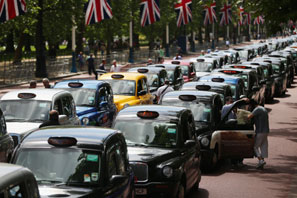
In July, New York City mayor Bill de Blasio called for a one-year cap on the number of for-hire cars on Gotham streets—targeting Uber, the app-based ridesharing service founded in San Francisco in 2009. In the face of furious political opposition and heavy media coverage, the mayor backed down. De Blasio need only have looked to London to understand how a fight against Uber would turn out.
When Uber arrived in London in March 2012, the city’s transportation market was already full of cars for hire, from iconic black cabs to so-called minicabs, licensed for prearranged rides. Yet Uber made an impact within months, and its business has steadily grown; it expects to serve 1 million riders this year and to add another 27,000 drivers next year. Every effort to kill Uber in London has only increased its popularity. The Licensed Private Hire Car Association called on Transport for London (TfL), the city’s transportation regulator, to ban cab-app services in the name of public safety. When that didn’t work, the taxi industry charged that Uber’s app functioned as a taximeter, which in London requires a license. In June 2014, 12,000 taxicab drivers held a citywide slowdown in protest of what they deemed Uber’s illegal use of a taximeter. “Of course it’s a bloody meter—it calculates fares,” said Steve McNamara, the general secretary of the Licensed Taxi Drivers Association. Yet Uber calculates fares in the cloud, not on the sort of physical device that the rules cover, and it routes payments through a Netherlands-based entity. “None of the laws were written for the modern mobile phone and app era,” said Sir Peter Hendy, the mayor’s transport commissioner. He declared Uber legal.
In London, as in New York, traditional taxis are feeling Uber’s pinch. License applications to drive black cabs are down 20 percent this year, and fewer drivers are willing to spend the two to four years necessary to master the Knowledge, a legendary test of drivers’ familiarity with London’s maze-like streets. London mayor Boris Johnson has acknowledged the taxicab industry’s concerns, expressing his own fears about “brash American Internet companies and the way they think they can come over and disrupt the market in this country.” But he refuses to defend the limitations on competition that licensed cabs long enjoyed. “I’m afraid it is a tragic fact that there are now more than a million people in this city who have the Uber app,” Johnson reminded a gathering of taxi drivers. “You are dealing with a huge economic force, which is consumer choice, and the taxi trade needs to recognize that.” London’s mayor has had a contentious relationship with taxi drivers. In mid-June of this year, Johnson got into a profane exchange with a cab driver who was shouting abuse at him.
Johnson then proposed a cap on the number of London’s private-hire minicabs, just as de Blasio would attempt to do in New York. In a statement, Johnson noted that “there are only 25,000 black cabs and 8,000 buses in London and yet there are already over 75,000 minicabs and rising.” Without naming Uber, he said, “We must be able to take action against the threat posed by the massive increase we are seeing in the number of private for-hire vehicles.” Uber lobbied hard against the cap. Jo Bertram, Uber’s head in London, declared that a “cap on the number of private hire licenses is effectively a limit on choice.” And in a gesture soon to be mimicked in New York City, Bertram offered to debate the cap with the mayor. Johnson ignored the challenge.
Johnson’s cap proposal may turn out to be a prelude to compromise. The mayor suggested that minicab drivers could perhaps be tested on a pared-down version of the Knowledge in order to operate. “There will have to be basic geographical knowledge,” said Johnson. “There would have to be basic English, basic command of the English language. I don’t think that’s an unreasonable thing, do you?” Hendy has now called on the High Court to rule whether or not Uber stands in violation of the taximeter law. That decision should come by October. “A binding High Court declaration will bring clarity on this issue for all parties,” explained Leon Daniels, TfL’s managing director of surface transport.
Even if the High Court rules against Uber, the company likely won’t abandon such a lucrative market, as the mayor recognizes. “I’m afraid that Uber will simply come back and change the model,” he says. “There’ll be an endless series of technical innovations.” Indeed, Uber’s influence has already changed the market. Nearly 5,000 black cabs now offer low, fixed prices on off-peak journeys booked through a new app, Gett. The Licensed Taxi Drivers Association concedes that its app is a direct response to Uber. Without the backing of London’s mayor for an outright ban on Uber, the taxi industry has recognized that it must compete on quality and price.